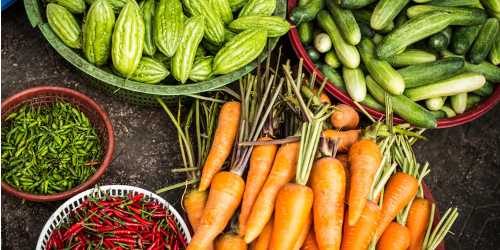Lately, I’ve noticed a trend at the grocery store.
When my wife and I had our first child, food pouches were relatively new to the parenting world. Although baby food had been around for decades, the pouch version allowed parents to squeeze the contents directly into the child’s mouth, avoiding the high likelihood of a mess being made at dinner time. In addition to being a relatively clean way to introduce solid foods to babies, many parents keep food pouches on hand for when their children stubbornly refuse to eat. In our experience, no matter how bad a mood she was in, our daughter would always suck down a pouch in record time.

Hidden Vegetables
Initially, a wide variety of foods were available in pouches, including those that were mostly or exclusively vegetables, whole grains, and lean meats. Over the last few years, however, I have noticed that more and more pouches are made exclusively out of fruit, or if they have any vegetables, the amount is quite small and they are designed to mask the vegetable flavor with a heavy dose of fruit. Gone are the broccoli/green beans/carrot pouches, replaced now with pear/apple/banana (with a touch of squash… maybe).
A different but related phenomenon can also be seen in the frozen foods section of the grocery store. There, one can buy popsicles that contain some amount of puréed vegetables in each one, with the rest made out of fruit juice.
It’s easy to see the appeal—when kids don’t want to eat their vegetables, at least they can get them hidden inside other foods! Sally gets a popsicle and her parents get the satisfaction of knowing she ate her vegetables. Win-win, right?
The problem is that if we’re not careful, they may never learn to like their vegetables, which I think we all agree is the preferred situation.
Loving God With Our Minds
There is a parallel here in the way we educate children. If we tell our parents “As long as he is reading, it doesn’t matter what the content is,” we ignore the formative effects literature can have on our students, and we can easily end up with our kids reading only gory vampire novels. Moreover, we abdicate our responsibility to influence their tastes toward the true, the good, and the beautiful, bringing them up in the enculturation of the Lord (Eph 6:4).
If we constantly mask education in the form of play or entertainment, or we rely on the latest attention-grabbing technology in an effort to stave off boredom, students may never learn to enjoy learning for its own sake. Tragically, they may never develop the deep satisfaction that comes from understanding. They may never make the connections between one body of knowledge and another. They may never see how the part integrates with the whole. They may never realize that all truth is God’s truth, and that by studying all that He has revealed to us, we can better know, enjoy, and glorify God.
The Great Feast
At RCA, we care deeply about the affections of the students who will attend our school—the ideas they love and the ones they have yet to discover. We will strive every day to nurture an environment where learning is not something that needs to be masked by sweet flavors, but that has its own sweetness. We will present our broad curriculum as a feast of great nourishment, and not as a candy store. We will hire teachers who love their disciplines, love the Lord, and love teaching the things He has put in front of us to study, discover, calculate, and create. We think this is the best way to acknowledge that each student, created in the image of God, has immeasurable capacity, but also carries the stain of sin. It is our responsibility, therefore—operating as an extension of the home—to teach our students with both truths in mind.
